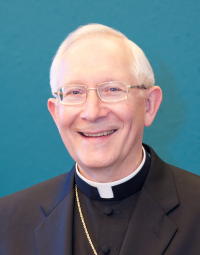
Archbishop Leonard P. Blair
I wish everyone a happy and healthy Year of Our Lord 2023. “All time belongs to Him,” we pro-claim at Easter, “and all the ages. To him be glory and power through every age and forever. Amen.”
Pope Francis says that we are not living in an “age of change” but “the change of an age.” Where are we head-ed? As human beings? As a society, as a church? Covid has disrupted people’s lives, including their participation at Sun-day Mass. For some there is a temptation not to return, or to keep postponing a return. Yet as the Catechism of the Catholic Church tells us, “the Sunday celebration of the Lord’s Day and his Eucharist is at the heart of the Church’s life” (no. 2177). Yes, it is an obligation, but a “family obligation” of love and participation, not a loveless duty. In his book The Difference God Makes the late Cardinal George of Chicago said that our American culture is always stressing “voluntary relationships,” the ones that I pick and choose for myself. But, he asks, what about the relation-ships that are “given” rather than chosen, the most “unchoosable” one being the particular family into which I was born.
The Church is a family too, a spiritual family constituted by Christ’s mystical body that embraces us all by Baptism. Yet isn’t it true that many Catholics nowadays think that coming together once a week as a family of faith for Mass is a “take it or leave it” kind of thing? Or they only ask: “What do I get out of this for myself?” “What’s in it for me?” It takes a pretty cold heart to ask what do I get out of loving my parents or of relating to my family. It’s no different when it comes to God our Father, the Church our mother, and all our brothers and sisters in the faith.
And if the truth be told, there’s plenty in it for me.
At Mass we are fed at the table of God’s Word. Jesus Himself speaks to us in the readings, provided that we open our ears to hear — not just the ears of our body but of our soul, our mind, our conscience, for the challenge of being converted and living by the “good news” during the coming week.
Then in the Eucharist, in a miracle repeated until the end of time, Jesus gives Himself to us as the Bread of Life. He says: “my flesh is real food and my blood is real drink,” without which “you can have no life in you.” In the Eucharist all that we are — our joys, successes, our disappointments and sufferings, our prayer and work — are united with Jesus and with his total offering on the Cross, and so are elevated to a divine purpose and plan of Resurrection. Our whole life in union with Christ is transformed into a gift of self, a spiritual sacrifice pleasing to God.
As with all families, in the church we don’t always show one another the familial love that we should, but as St. John of the Cross once said so beautifully: “Where there is no love, put love, and you will find love.” Family members put up with one another’s faults and failings out of love and respect. They bear one another’s burdens and unselfishly help one another. They instinctively recognize the duty of love and care that they should have toward their relatives. The same is true in the family of faith that is the church.
Participation at Mass on Sundays and Holy Days is a fundamental obligation of membership in the Church. But as Pope St. John Paul once explained, the Eucharist is Christ’s greatest gift to us, and “a gift obliges us ever more profoundly since we are compelled not so much by the force of a law as such, but by virtue of something entrusted to us, so that even apart from legal obligations, what is required is our trust and gratitude … We must remain faithful in every detail to what it expresses in itself, and to what it asks of us, namely, thanksgiving.”
In the midst of today’s many challenges to Mass attendance, it is a great act of spiritual kindness on our part to lead back to Sunday Mass those of our relatives, friends and neighbors who do not attend. Ask God for the courage to invite them!
